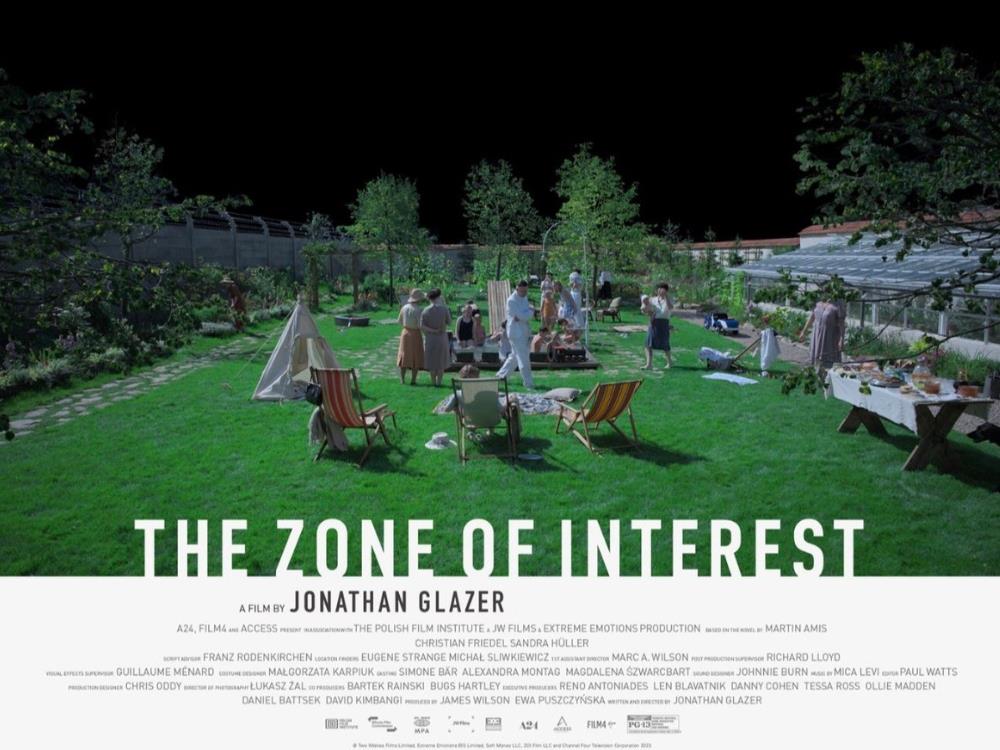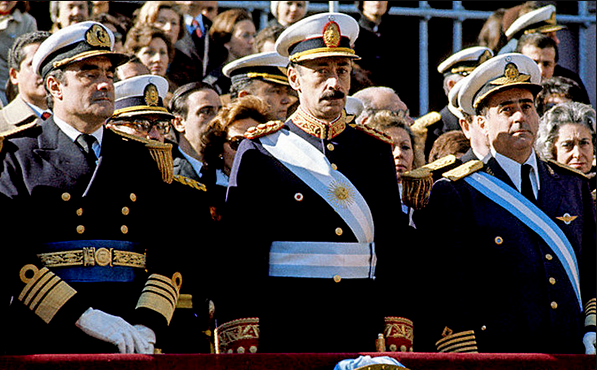1942, a river in Poland. A family in bathing costumes and summer dresses hover tentatively by the waterside, having a picnic. After a while, the boys go to splash around in the water while the girls collect berries. At the end of an idyllic day, the family return to their sumptuous villa which has its own swimming pool. These scenes of domestic bliss follow a couple of minutes of a blank screen while we listen to discordant music with ever-increasing volume.
Back at the villa, the kids have a birthday present for father Rudolf – a long canoe which can carry up to four people. He fusses about them, saying he’ll have to decide which of them he’ll take out to the lake first. Meanwhile mother Hedwig (played by the woman who, notwithstanding her many other successes is doomed to be known as “Toni Erdmann’s Sandra Hüller”) pootles along in the background doing her chores.
Not that Hedwig has much to do. The house is full of maids and men who clean everything, including Rudolf’s boots. The family carry out a mundane bourgeois lifestyle, spending as much time as they can in their beautiful garden and large conservatory. At the end of the garden, there is a stone wall behind which you can see a large brick chimney from which black smoke occasionally billows. At the end of each eventless day, Rudolf and Hedwig retire to their separate twin beds.
Occasionally, very occasionally, we leave the villa, mainly to accompany Rudolf to work. You see, Rudolf is the Commandant in charge of Auschwitz Concentration Camp. Even here, his life seems to be full of dull meetings where SS officers discuss the most effective forms of deportation and execution with exacting meticulousness. Anyone who has ever cracked a joke about over-officious Germans will find affirmation on screen.
At home. Rudolf spends his time with the kids reading them bedtime stories or taking them out horseback riding. One afternoon, they go out fishing and canoeing together. Their fun is broken when Rudolf notices ash and bone floating on the water – presumably the remains of former camp inmates. With his usual speed and efficiency, he orders the kids out of the water and back home, where he ensures that they are thoroughly washed down.
A serpent enters Eden when Rudolf is ordered back to Berlin. On its face, this is a promotion – as a reward for his efficiency, he has been put in charge of “dealing with” Hungarian Jews. Although Hedwig is proud of her husband, she is aghast that this may destroy everything that they have built together. Haven’t they been trying since they were 17 to create a peaceful home in the country, just like the one they have now?
The most incredible part of the film is the unobtrusive background sounds – an occasional shriek, the odd gunshot, a dog barking, the incessant rumbling of a furnace. They are always there, but somehow we get used to them, in the way that the Höss family is able to separate the horror which is happening on the other side of the wall from their daily lives. Hedwig, for instance, does not come over as a polemicizing Nazi. She doesn’t seem to think much about politics at all.
It is difficult to watch The Zone of Interest without thinking of Hannah Arendt’s phrase “the banality of evil”, which feels like a cliché but fits just so well here. And yet for all the numbing conventionality of her everyday life, Hedwig clearly benefits from the evil being carried out on the other side of the fence. We see her trying on a fur coat pillaged from Jewish prisoners. She finds some lipstick left by the previous owner in one of the pockets. In the next scene, she is putting on some lippy.
Later, Hedwig and her friends joke about the benefits they gain from their unpaid housemaids. In other scenes, the power imbalance between mistress and maid is palpable. Hedwig’s maids know that she just has to say the word, and they will end up on the other side of the wall. Hedwig knows this too, and for all her bourgeois respectability, she is not afraid of using the horrific situation to impose her power over her underlings.
When the Holocaust memorial was built in Berlin, there was serious debate about whether it was possible to depict the Holocaust. Theodor Adorno’s quote “No poetry after Auschwitz” was dusted off. I think that architect Peter Eisenman took the correct decision to design an abstract series of blocks, as it is just not possible to visually represent the immensity of the horrors of the industrial genocide of millions of Jews, trade unionists, Roma and Sinti people and many more.
Director Jonathan Glazer has a similar problem with The Zone of Interest. Whatever he shows cannot be as shocking as the real thing. So it is a brave, but in my opinion, effective, move on his part not to show any of the terror, apart from a coda filmed in the modern day Holocaust museum where we see cleaners passing glass display cases full of suitcases and shoes robbed from people who were to be murdered in Auschwitz.
Most of the film is shot from a distance, which is perfectly understandable, as we should avoid any semblance of identification with the main characters. At the same time, Glazer has said that his intention was to show “our similarities with the perpetrators”. By this, I understand him to mean that The Zone of Interest is not just a film about something which happened in history, but real political developments in the world today.
At the recent BAFTA awards, The Zone of Interest won the award for best “foreign-language” film. In his acceptance speech, producer James Wilson talked about “the walls we choose not to look behind”, saying, to applause: “those walls aren’t new, from before or during or since the Holocaust, and it seems stark right now that we should care about innocent people being killed in Gaza or Yemen in the same way we think about innocent people being killed in Mariupol or in Israel.”
It is important that The Zone of Interest was filmed in German, for more than one reason. Firstly, for authenticity. It makes a difference whether we hear people speaking in the language of the protagonists instead of English with a stereotypical “Tscherman” accent. But also, at a time when Germany is both seeing a rise of the AfD and a civil society which is reluctant to accept that Never Again must also apply to Palestinians, this is a film which Germany needs to engage with.
The Zone of Interest is an incredible accomplishment, but is it any good? It’s certainly not fun to watch. There is also no happy redemptive ending. No-one has a Damascene conversion and discovers the barbarity of their actions. Which is absolutely fitting, as the film is recording actual history, not a story which we would like to tell ourselves to ignore the brutality of everyday life (or the financiers who were quite happy to enable Nazism to thrive in Germany).
The film is not entirely without hope. Everything is filmed in natural light, the one exception being a single scene filmed using thermal imaging. A girl – she is maybe 14 – gets on her bicycle, and – avoiding the passing security patrols – takes apples to leave near the gravel quarries where the camp inmates are forced to work. The girl is clearly Polish, living nearby while being a member of the partisan forces. Her actions show that humanity has not entirely deserted the area.
There are some films which are great to watch, but if you’ve seen them once, that’s all you need to see. This is not one of those films. In fact, knowing what is going to happen increases your appreciation of The Zone of Interest. It is hard work, a film which makes you think, and is not afraid to make you suffer. It would not necessarily be my preferred Oscar winner, but it is in a quite different league to superficial baubles like Oppenheimer.
This review originally appeared on the cinephil Berliner Film Blog



